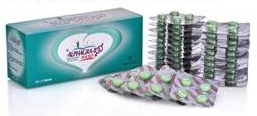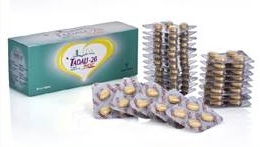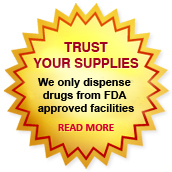Provanol SR (Propranolol Hydrochloride Sustained Release Tablets) - Product Information
Propranolol Hydrochloride Sustained Release Tablets (Provanol SR) belongs to a group of medicines called beta-blockers and is used to treat high blood pressure, an enlarged heart muscle or tremors, treat angina pectoris (pain in the chest caused by blockages in the arteries leading to the heart) or high blood pressure caused by a tumour near a kidney (phaeochromocytoma). This medicine is also used to help prevent additional heart attacks, control irregular or fast heart beats, control fast heart rate and other symptoms caused by an overactive thyroid gland, to reduce migraine attacks, calm people who are anxious or worried and prevent stomach bleeding in patients with high blood pressure in their liver or swollen blood vessels in their gullet.
Provanol SR tablets are manufactured by Intas Pharmaceuticals Ltd., India in the strengths of 40 mg, 60 mg and 80 mg. We also have in stock Amlopres (Amlodipine Besylate tablets) which which are prescribed as oral therapy for the effective treatment of high blood pressure (hypertension) and chest pain (angina) in adults and children above the age of 6 years old.
Name of the Drug
We supply original Provanol SR manufactured by Intas Pharmaceuticals Ltd., India. They are also known as Generic Propranolol, Propranolol Hydrochloride Long Acting tablets or Propranolol Hydrochloride Sustained Release tablets.
Manufacturer of Provanol SR Tablets (Propranolol Hydrochloride Long Acting Tablets)
Intas Pharmaceuticals Ltd.
Website:www.intaspharma.com
Active Ingredient present in Provanol SR Tablets
The active ingredient present in Provanol SR tablets is Propranolol Hydrochloride. Each sustained release tablet contains 40 mg, 60 mg or 80 mg of Propranolol Hydrochloride IP respectively.
What Are Propranolol Hydrochloride Tablets Used For?
Propranolol Hydrochloride (Provanol SR Tablets) is a beta blocker used to treat high blood pressure, irregular heartbeats, shaking (tremors), and other conditions. It is used after a heart attack to increase the chance of survival. This medicine is also used to prevent migraine headaches and chest pain (angina). Lowering high blood pressure helps to prevent strokes, heart attacks, and kidney problems. Preventing chest pain can help to improve your ability to exercise.
How Long Does It Take For Propranolol To Kick In?
It depends on the indication. For example, some people use this medication as needed for certain events that cause them anxiety. When this is the case, they might just take Propranolol 30 minutes to one hour before the event. Other people take Propranolol for more generalized anxiety.
Should Propranolol Hydrochloride Tablets be Taken Before Or After Food?
Provanol SR (Propranolol Hydrochloride Sustained Release Tablets) may be taken before or after food.
Provanol SR (Propranolol Hydrochloride Sustained Release Tablets) - Dosage
The adult dosage of Provanol SR (Propranolol Hydrochloride Sustained Release Tablets) for various indications is given below:
Hypertension in Adults:
A starting dose of 80 mg twice a day may be increased at weekly intervals according to response. The usual dose range is 160 mg to 320 mg per day. With concurrent diuretic or other anti-hypertensive drugs a further reduction of blood pressure is obtained.
Angina, Anxiety, Migraine and Essential Tremor:
A starting dose of 40 mg two or three times daily may be increased by the same amount at weekly intervals according to the patient response. An adequate response in anxiety, migraine and essential tremor is usually seen in the range 80 mg to 160 mg/day and in angina in the range 120 mg to 240 mg/day.
Dysrhythmias, Anxiety Tachycardia, Hypertrophic Obstructive Cardiomyopathy and Thyrotoxicosis:
A dosage range of 10 mg to 40mg three to four times a day usually achieves the required response.
Migraine:
The initial dose is 80 mg Provanol SR (Propranolol Hydrochloride Sustained Release Tablets) daily in divided doses. The usual effective dose range is 160 mg to 240 mg per day. The dosage may be increased gradually to achieve optimum migraine prophylaxis. If a satisfactory response is not obtained within four to six weeks after reaching the maximum dose, Provanol SR therapy should be stopped. It may be advisable to withdraw the medicine gradually over a period of several weeks.
Essential Tremor:
The starting dosage is 40 mg Provanol SR twice daily. Optimum reduction of essential tremor is usually achieved with a dose of 120 mg per day. Occasionally, it may be necessary to administer 240 mg to 320 mg per day.
Hypertrophic Subaortic Stenosis:
The usual dosage is 20 mg to 40 mg Inderal three or four times daily before meals and at bedtime.
Post Myocardial Infarction:
Treatment should start 5 days to 21 days after myocardial infarction, with an initial dose of 40mg four times a day for 2 to 3 days. In order to improve compliance the total daily dose can thereafter be given as 80 mg twice a day.
Phaeochromocytoma:
To be used only with an alpha-adrenoreceptor blocking medicine.
Pre-operative:
A dosage of 60 mg daily for 3 days is recommended.
Non-operative malignant cases:
A dosage of 30 mg daily
In Case You Take More Propranolol Tablets Than You Should
If you have accidentally taken more than the prescribed dose, contact your nearest casualty department or tell your doctor or pharmacist immediately. Propranolol Hydrochloride Long Acting tablets Overdose causes difficulty breathing, low blood pressure, drowsiness, fits, dilated pupils, an excessively slowed heart beat with symptoms such as dizziness, sickness, confusion, hallucinations, body spasms, breathlessness on exertion, fainting or coma. Overdose could result in heart attack.
Missed Dose Instructions
If you forget to take a dose, take it as soon as you remember, unless it is nearly time for your next dose. Then go on as before. Do not take a double dose to make up for a forgotten tablet
Provanol SR Tablets - Storage
Store Provanol SR (Propranolol Hydrochloride Long Acting tablets) at controlled room temperature 20° C to 25°C (68°F to 77°F). Excursions permitted to (59°F to 86°F, 15°C to 30°C). Protect from light.
Provanol SR Contraindications
Provanol SR tablets are contraindicated in patients with a hypersensitivity to Propranolol Hydrochloride or any inactive ingredient present in Provanol SR tablets. Provanol SR tablets are contraindicated in the following cases:
- 1)Cardiogenic shock
- 2)Sinus bradycardia and greater than first-degree block
- 3)Patients with a history of or current reports of bronchial asthma or bronchospasm.
- 4)Congestive heart failure unless the failure is secondary to a tachyarrhythmia treatable with propranolol hydrochloride.
- 5)Right ventricular failure secondary to pulmonary hypertension
- As with other beta-blockers, the drug must not be used in patients with any of the following: bradycardia, hypotension, metabolic acidosis, severe peripheral arterial circulatory disturbance, sick sinus syndrome, untreated phaeochromocytoma, uncontrolled heart failure, Prinzmetal's angina.
Propranolol Hydrochloride ( Provanol SR Sustained Release Tablets) Mechanism of Action
The mechanism of the antihypertensive effect of Propranolol Hydrochloride has not been established. Among the factors that could be involved in contributing to the antihypertensive action are: (1) decreased cardiac output, (2) inhibition of renin release by the kidneys, and (3) diminution of tonic sympathetic nerve outflow from vasomotor centers in the brain. Although total peripheral resistance may increase initially, it readjusts to or below the pretreatment level with chronic use. Effects on plasma volume appear to be minor and somewhat variable.
In angina pectoris, Propranolol Hydrochloride ( Provanol SR Sustained Release Tablets) generally reduces the oxygen requirement of the heart at any given level of effort by blocking the catecholamine-induced increases in the heart rate, systolic blood pressure, and the velocity and extent of myocardial contraction. Propranolol could increase oxygen requirements by increasing left ventricular fiber length, end diastolic pressure, and systolic ejection period. The net physiologic effect of beta-adrenergic blockade is usually advantageous and is manifested during exercise by delayed onset of pain and increased work capacity.
Warnings and Precautions
Angina Pectoris:
There have been reports of exacerbation of angina and, in some cases, myocardial infarction, following abrupt discontinuance of propranolol therapy. Therefore, when discontinuance of Propranolol Sustained Release tablets is planned, the dosage should be gradually reduced over at least a few weeks and the patient should be cautioned against interruption or cessation of therapy without the doctor's advice. If Provanol SR therapy is interrupted and exacerbation of angina occurs, it usually is advisable to reinstitute Provanol SR therapy and take other measures appropriate for the management of angina pectoris.
Hypersensitivity and Skin Reactions:
Hypersensitivity reactions, including anaphylactic/anaphylactoid reactions, have been associated with the administration of Propranolol Hydrochloride Sustained Release tablets.
Cutaneous reactions, including Stevens-Johnson Syndrome, toxic epidermal necrolysis, exfoliative dermatitis, erythema multiforme, and urticaria, have been reported with use of Propranolol Hydrochloride tablets.
Cardiac Failure:
Sympathetic stimulation may be a vital component supporting circulatory function in patients with congestive heart failure, and its inhibition by beta blockade may precipitate more severe failure. Although beta blockers must be avoided in overt congestive heart failure, some have been shown to be highly beneficial when used with close follow-up in patients with a history of failure who are well compensated and are receiving additional therapies, including diuretics as needed. Beta-adrenergic blocking agents do not abolish the inotropic action of digitalis on heart muscle.
In Patients without a History of Heart Failure, continued use of beta blockers can, in some cases, lead to cardiac failure.
Nonallergic Bronchospasm (e.g., Chronic Bronchitis, Emphysema):
In general, patients with bronchospastic lung disease should not be administered beta blockers. Propranolol Sustained Release tablets (Provanol SR) should be administered with caution in this setting since it may provoke a bronchial asthmatic attack by blocking bronchodilation produced by endogenous and exogenous catecholamine stimulation of beta-receptors.
Major Surgery:
Chronically administered beta-blocking therapy should not be routinely withdrawn prior to major surgery, however the impaired ability of the heart to respond to reflex adrenergic stimuli may augment the risks of general anesthesia and surgical procedures.
Diabetes and Hypoglycemia:
Beta-adrenergic blockade could stop the appearance of certain premonitory signs and symptoms (pulse rate and pressure changes) of acute hypoglycemia, especially in labile insulin-dependent diabetics. In these patients, it may be more difficult to adjust the dosage of insulin.
Propranolol (Provanol SR) therapy, particularly when given to infants and children, diabetic or not, has been associated with hypoglycemia, especially during fasting as in preparation for surgery. Hypoglycemia has been reported in patients taking propranolol after prolonged physical exertion and in patients with renal insufficiency.
Thyrotoxicosis:
Beta-adrenergic blockade may mask certain clinical signs of hyperthyroidism. Therefore, abrupt withdrawal of propranolol may be followed by an exacerbation of symptoms of hyperthyroidism, including thyroid storm. Propranolol may change thyroid-function tests, increasing T4 and reverse T3 and decreasing T3.
Wolff-Parkinson-White Syndrome:
Beta-adrenergic blockade in patients with Wolf-Parkinson-White Syndrome and tachycardia has been associated with severe bradycardia requiring treatment with a pacemaker. In one case, this result was reported after an initial dose of 5 mg propranolol.
Pheochromocytoma:
Blocking only the peripheral dilator (beta) action of epinephrine with propranolol leaves its constrictor (alpha) action unopposed. In the event of hemorrhage or shock, there is a disadvantage in having both beta and alpha blockade since the combination prevents the increase in heart rate and peripheral vasoconstriction needed to maintain blood pressure.
Other Precautions:
Propranolol should be used with caution in patients with impaired hepatic or renal function. Propranolol is not indicated for the treatment of hypertensive emergencies.
Beta-adrenergic receptor blockade can cause reduction of intraocular pressure. Patients should be told that Propranolol Hydrochloride (Provanol SR tablets) could interfere with the glaucoma screening test. Withdrawal may lead to a return of increased intraocular pressure.
While taking beta blockers, patients with a history of severe anaphylactic reaction to a variety of allergens may be more reactive to repeated challenge, either accidental, diagnostic, or therapeutic. Such patients may be unresponsive to the usual doses of epinephrine used to treat allergic reaction.
Alcohol With Propranolol
Alcohol, when used concomitantly with Propranolol Hydrochloride (Provanol SR tablets), may increase plasma levels of Propranolol
Driving And Using Machines When using Propranolol Hydrochloride Sustained Release Tablets
The use of Propranolol is not likely to result in any significant impairment of the ability of patients to drive or operate machinery. However, patients should be warned that Provanol SR (Propranolol Hydrochloride Sustained Release tablets) may cause visual disturbances, hallucinations, fatigue, mental confusion, dizziness, drowsiness or tiredness and they should not drive or operate machinery if they feel affected. Make sure you are not affected before you drive or operate machinery.
Provanol SR (Propranolol Hydrochloride Sustained Release Tablets) Side Effects
The following side effects were observed and have been reported in patients using Provanol SR (Propranolol Hydrochloride Sustained Release Tablets).
Cardiovascular:
Bradycardia; congestive heart failure; intensification of AV block; hypotension; paresthesia of hands; thrombocytopenic purpura; arterial insufficiency, usually of the Raynaud type.
Central Nervous System:
Light-headedness, mental depression manifested by insomnia, lassitude, weakness, fatigue; catatonia; visual disturbances; hallucinations; vivid dreams; an acute reversible syndrome characterized by disorientation for time and place, short-term memory loss, emotional lability, slightly clouded sensorium, and decreased performance on neuropsychometrics. For immediate-release formulations, fatigue, lethargy, and vivid dreams appear dose-related.
Gastrointestinal:
Nausea, vomiting, epigastric distress, abdominal cramping, diarrhea, constipation, mesenteric arterial thrombosis, ischemic colitis.
Allergic:
Hypersensitivity reactions, including anaphylactic/anaphylactoid reactions, pharyngitis and agranulocytosis; erythematous rash, fever combined with aching and sore throat; laryngospasm, and respiratory distress.
Respiratory:
Bronchospasm. Hematologic: Agranulocytosis, nonthrombocytopenic purpura, thrombocytopenic purpura.
Autoimmune:
Systemic lupus erythematosus (SLE).
Skin and mucous membranes:
Stevens-Johnson Syndrome, toxic epidermal necrolysis, dry eyes, exfoliative dermatitis, erythema multiforme, urticaria, alopecia, SLE-like reactions, and psoriasiform rashes.
Genitourinary:
Male impotence; Peyronie's disease.
Propranolol Hydrochloride Sustained Release Tablets Overdosage
Symptoms of Propranolol Hydrochloride (Provanol SR tablets) overdose include:
Cardiac - Bradycardia, hypotension, pulmonary oedema, syncope and cardiogenic shock may develop. Conduction abnormalities such as first or second degree AV block may occur. Rarely arrhythmias may occur. Development of cardiovascular complications is more likely if other cardioactive drugs, especially calcium channel blockers, digoxin cyclic antidepressants or neuroleptics have also been ingested. The elderly and those with underlying ischaemic heart disease are at risk of developing severe cardiovascular compromise.
CNS –Drowsiness, confusion, seizures, hallucinations, dilated pupils and in severe cases coma may occur. Neurological signs such as coma or absence of pupil reactivity are unreliable prognostic indicators during resuscitation.
Other features – bronchospasm, vomiting and occasionally CNS-mediated respiratory depression may occur. The concept of cardioselectivity is much less applicable in the overdose situation and systemic effects of beta-blockade include bronchospasm and cyanosis, particularly in those with pre-existing airways disease. Hypoglycaemia and hypocalcaemia are rare and occasionally generalised spasm may also be present.
Propranolol Hydrochloride (Provanol SR) is not significantly dialyzable. In the event of overdosage or exaggerated response, the following measures should be employed:
General: In case ingestion is or may have been recent, evacuate gastric contents, taking care to prevent pulmonary aspiration.
Supportive Therapy: Hypotension and bradycardia have been reported following Propranolol Hydrochloride overdose and should be treated appropriately. Glucagon can exert potent inotropic and chronotropic effects and may be particularly useful for the treatment of hypotension or depressed myocardial function after a propranolol overdose.
Glucagon should be administered as 50150 mcg/kg intravenously followed by continuous drip of 1 mg to 5 mg/hour for positive chronotropic effect. Isoproterenol, dopamine or phosphodiesterase inhibitors may also be useful. Epinephrine, however, may provoke uncontrolled hypertension.
Bradycardia can be treated with atropine or isoproterenol. Serious bradycardia may require temporary cardiac pacing.
The electrocardiogram, pulse, blood pressure, neurobehavioral status and intake and output balance must be monitored. Isoproterenol and aminophylline may be used for bronchospasm.
Propranolol Hydrochloride During Pregnancy
Propranolol Hydrochloride (Provanol SR Tablets) has been classified by the US FDA as Pregnancy Category C. In a series of reproductive and developmental toxicology studies, propranolol hydrochloride was given to rats by gavage or in the diet throughout pregnancy and lactation. At doses of 150 mg/kg/day, but not at doses of 80 mg/kg/day (equivalent to the MRHD on a body surface area basis), treatment was associated with embryotoxicity (reduced litter size and increased resorption rates) as well as neonatal toxicity (deaths).
There are no adequate and well-controlled studies in pregnant women. Intrauterine growth retardation, small placentas, and congenital abnormalities have been reported in neonates whose mothers received propranolol during pregnancy. Neonates whose mothers received Propranolol Hydrochloride tablets at parturition have exhibited bradycardia, hypoglycemia, and/or respiratory depression. Adequate facilities for monitoring such infants at birth must be available. Provanol SR (Propranolol Hydrochloride Sustained Release Tablets) should be used during pregnancy only if the potential benefit justifies the potential risk to the fetus.
Do not use this medicine without your doctor's consent in case you are pregnant. Stop using this medication and inform your doctor immediately if you become pregnant during treatment.
Propranolol Hydrochloride Tablets Nursing Considerations
Propranolol Hydrochloride is excreted in human milk. Caution should be exercised when Provanol SR is administered to a nursing woman.
Do not use this medication without telling your doctor if you are breast-feeding a baby.
Buy Provanol SR (Propranolol Hydrochloride Long Acting Tablets) 40 mg, 60 mg and 80 mg Pills Online at Only $0.27 per Pill
You can buy Propranolol Hydrochloride Long Acting tablets online from Clear Sky Pharmacy at a cheap price. Provanol SR 40 mg, 60 mg and 80 mg pills, manufactured by Intas Pharmaceuticals Ltd., India are supplied in a blister strip of 10 tablets. The 40 mg tablets cost only $0.27 per unit when you place an order for 300 tablets.
Disclaimer
The above information is provided to the best of our knowledge and in good faith, it is without a warrant of any kind, expressed or implied.
Shipping Restriction
There are no Shipping restrictions for this product.







